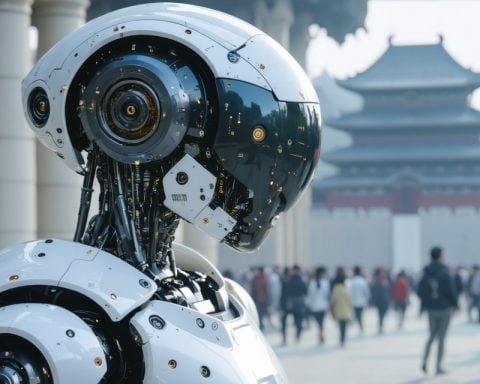- China’s leadership is rallying tech giants to focus on technological innovation and AI supremacy.
- President Xi Jinping emphasizes collaboration between government and private sectors for AI development.
- Shifts in policy indicate a move away from past regulatory constraints towards encouraging private innovation.
- China aims to transform its vast market into a hub for advanced technological advancements.
- Facing global competition, especially from the US, China’s strategy underscores the indispensability of private sector initiatives.
- NVIDIA’s release of Evo 2 AI model marks a significant advance in decoding genetic information and generative biology.
- Opportunities for economic growth and competitive advantage arise from these AI innovations, drawing interest from investors and industry pioneers.
A monumental shift echoes through the iconic halls of Beijing as President Xi Jinping gathers China’s tech titans under a single, ambitious goal. As global giants like the United States set a relentless pace toward AI supremacy, China’s leadership has amplified its call to arms, rallying private businesses to the frontline of technological innovation.
Amidst lavish surroundings, Jack Ma, once a scrutinized figure, and other industry leaders are urged to unleash their potential and steer China toward a self-reliant future. This dramatic turn in policy marks a departure from past stringent regulations and highlights the growing necessity for collaboration between the government and private sector—a partnership critical for China to match and perhaps outpace the US in AI development.
The message stands clear: China’s vast market and collaborative environment are fertile grounds for groundbreaking technological advancements. Faced with external pressures and the American surge toward technological dominance, China’s decision-makers understand that private innovation is not just preferred but indispensable.
Enter NVIDIA Corporation, a dominant force in the AI arena. Against this backdrop, it has just released Evo 2, a groundbreaking AI model that offers researchers unprecedented tools to decode the genetic blueprints of life. This leap represents a giant stride in generative biology, proving critical for future scientific endeavors.
The stage is set for a nexus of innovation where new opportunities promise robust economic growth and competitive advantage on the world stage. For savvy investors and pioneers alike, this is a call to seize momentum, riding the powerful wave of AI that reshapes boundaries and defines the future.
How China’s AI Push is Reshaping the Global Tech Landscape
Strategic Overview of China’s AI Initiative
In a strategic realignment, China is harnessing the capabilities of its tech giants, notably led by President Xi Jinping, to foster an environment ripe for innovation in artificial intelligence. This shift is particularly focused on creating a self-reliant future by reducing dependency on foreign technology and enhancing domestic capabilities. Critical to this agenda is the collaboration between the private sector and the government, moving away from past stringent regulations.
Real-World Use Cases & Industry Impact
The emphasis on AI isn’t just about economic growth; it’s also about transforming sectors such as healthcare, automotive, and biotechnology. For instance, AI-driven medical diagnostics and autonomous vehicles offer revolutionary possibilities that could redefine these industries.
NVIDIA’s release of the Evo 2 AI model is a prime example, driving advancements in generative biology that could potentially lead to breakthroughs in personalized medicine and genetic research. As researchers gain new tools to decode the genetic blueprints of life, such models are pivotal for scientific progress.
Market Forecasts & Industry Trends
The global AI market is projected to exceed USD 500 billion by 2025, with China poised to capture a significant share due to its strategic investments and government backing. By encouraging innovation, China aims to rival, if not surpass, the US in AI capabilities, as it solidifies its role as a global tech leader.
Pros & Cons Overview
Pros:
– Economic Growth: By advancing AI technologies, China is likely to experience substantial economic growth.
– Technological Advancements: Enhanced AI applications could lead to breakthroughs across various sectors.
Cons:
– Regulatory Challenges: Balancing innovation with security and privacy concerns remains a significant challenge.
– Global Tensions: Heightened competition with Western nations could lead to geopolitical tensions.
Security & Sustainability
AI developments come with concerns regarding data security and the ethical implications of AI usage. Ensuring robust cybersecurity measures and sustainable practices is crucial in preventing misuse and ensuring the technology’s long-term viability.
Reviews & Comparisons
When comparing China and the US’s AI strategies, it is evident that both nations are leveraging their unique strengths. The US benefits from a robust entrepreneurial ecosystem and technological infrastructure, while China’s centralized approach facilitates rapid policy deployment and resource allocation.
Actionable Recommendations
1. Invest in AI Talent: Companies and educational institutions should prioritize developing AI skills to support the burgeoning sector.
2. Explore Partnerships: Collaborative projects between public and private entities can accelerate advancements and open new markets.
3. Stay Informed: Keeping abreast of developments in AI technology and policy will enable businesses and investors to pivot strategies effectively.
For further understanding and updates on global tech trends, consider visiting reputable sources like BBC or CNN.













